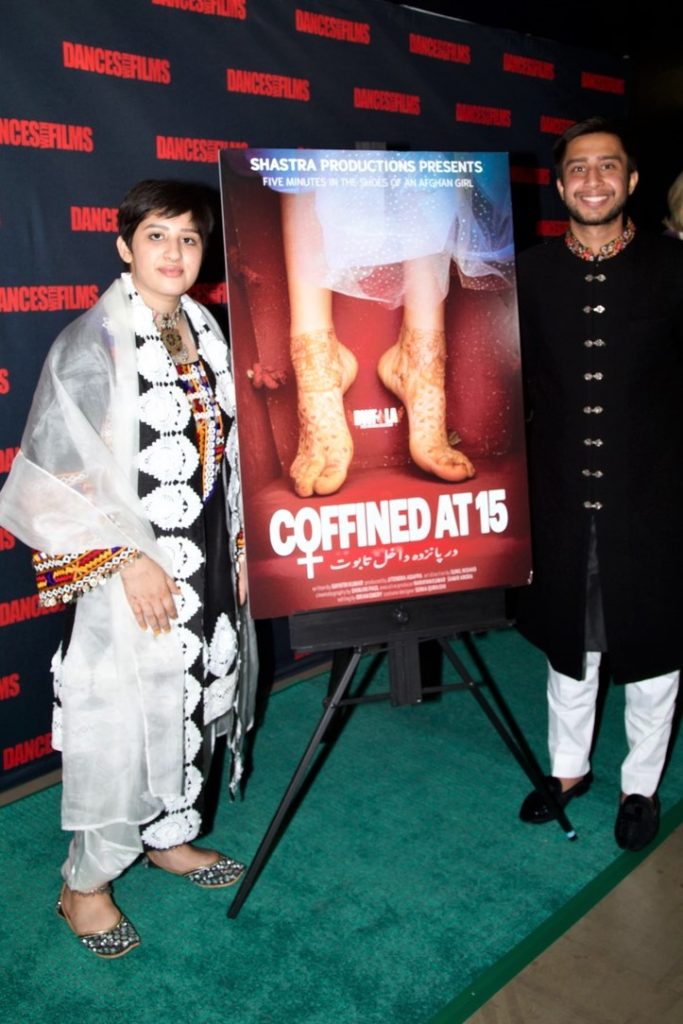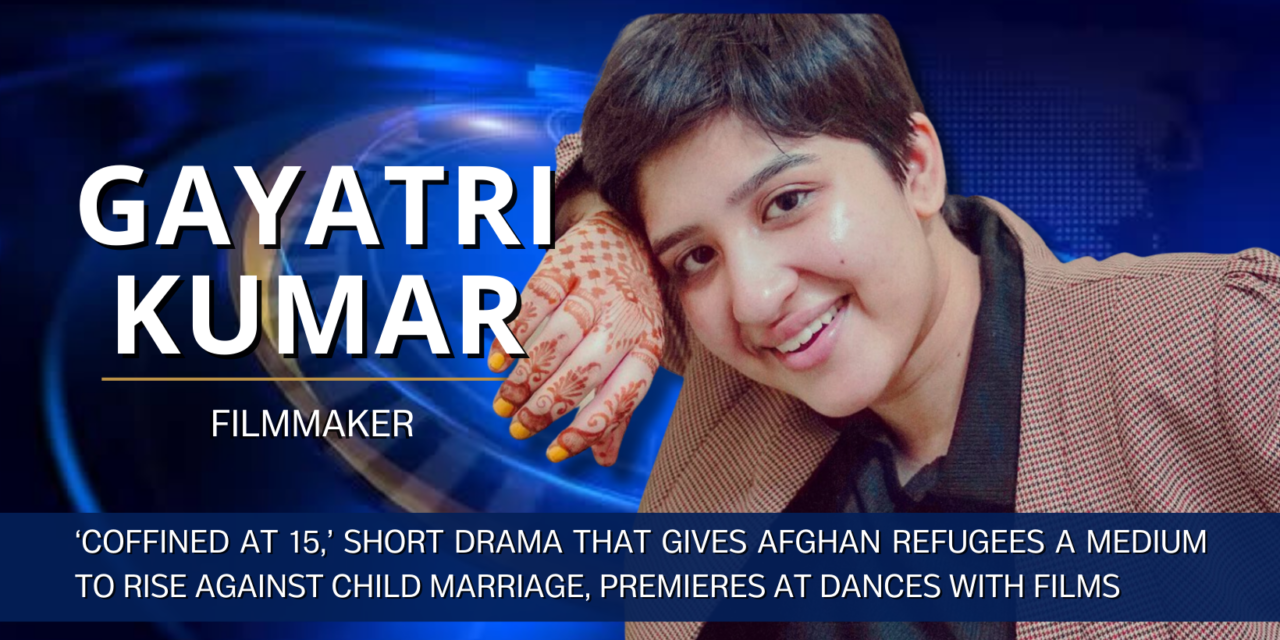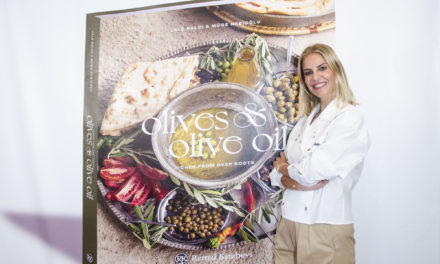Coffined at 15 by Indian/American female filmmaker Gayatri Kumar had its world premiere at Dances With Films on Sunday, June 12 at the TCL Chinese Theatres in Hollywood, California. Inspired by Kumar’s conversation with a child bride in Afghanistan, the short drama uncovers a new perspective on the topic in a country where very young girls are sold to be married.

Gayatri Kumar and Narayan Kumar
Shot in Noida, India, the film is set in present day Afghanistan – one of most dangerous places for women today. Fifteen-year-old Rihana is put into a coffin at the hands of her father to be sold off to an old Taliban soldier. The wedding is a cocktail of tears and laughter. Rihana calls for help but no one answers. Then she remembers her God. With a cast consisting of Afghan refugees, this short film showcases real tears and fears from those who have been victims at the hands of the Taliban.
“You don’t have to leave Earth to find hell. It exists in a country called Afghanistan where girls as young as two-months-old are sold off into marriage. Coffined At 15 is my experiment in preparing a global audience to empathize with a plight they’ve never experienced,” comments Kumar. “The film may be short, but it’s not about how long it runs on the screen. It’s about how long it lasts in your hearts. I’m proud to say this has film has a long shelf life. It’s something that our team will keep in their hearts and take to their graves.”
In attendance was E! founder Larry Namer who commented, “Coffined at 15 is a great example of how innovative young filmmakers are bringing some of the harsh realities of this world to the front of our consciousness. I applaud the team behind this film for the way in they captured the horror of modern day Afghanistan for women and presented it in a way that seemed factual and not overly politicized.”

Larry Namer and Ninon Aprea at Premiere of ‘Coffined At 15″
In casting the film, Kumar experimented with a new approach of democratic filmmaking that had nothing to do with politics, and everything to do with sharing the creative journey with those who inspired her film. All of the characters in the film were not played by actors but by actual Afghan refugees who fled to Delhi, India after facing harassment and trauma at the hands of the Taliban. Kumar and research analyst Sonia Quraishi, who was also traumatized by the Taliban, literally went door to door to cast the film. While many were afraid to participate, the refugees cast in the short showed great bravery and wanted their people’s voices heard. With the help of acting coach Gulshan Walia, Kumar was able to get the cast members ready for their first film shoot in only five days.
By casting refugees, this film has given Afghans ownership and earnings over their own tears and stories, instead of having the profits go to professional actors. The tears and fears in the film are all real and have become a mobilizing call to action for the entire world. Kumar was inspired to cast non-actor Afghan refugees because of the conversation she had with the Afghan refugee girl who said she wants to be an actor but will probably end up becoming a housewife.
Nasib Popal, who plays the role of the bride’s father says: “I know we won’t be able to go back to our country and loved ones after doing this film, but that’s a risk we will have to take if we have any chance at making our voices heard.”
As a female filmmaker who makes films on women-based issues, it seemed impossible to Kumar that anyone could let such a subject matter slip through the cracks. “America is a country that will spend millions to save endangered species in distant lands. Why can’t they see the millions of women who are dragged like sheep to the slaughter?,” adds Kumar. The short drama is a message from an American woman to all Afghan women that we still care. The film’s team even launched a bread movement in Kabul, Afghanistan, where they’ve distributed over 3,000 bread loafs in order to prevent the sale of children.
The film is the proof of concept work for the director’s first full-length drama One Day Before Being Sold, for whose pitch was named a semifinalist in ScreenCraft’s Virtual Pitch Competition. The film’s team also includes writer Amol Bahadur and executive producer Narayan Kumar.
A novel feature in the short is its musical fight between the Taliban’s Attan (song of praise) and the country’s Azan (Muslim call to prayer). “The Taliban were also made by God. They also practice Islam. So, this film gives justice to everyone—the heroes and the villains. We had one of Bollywood’s biggest playback singers Shadab Farid sing the Taliban’s Attan in the film,” explains Kumar.
Writer/director Kumar graduated from Sarah Lawrence College in 2021. Kumar’s ultimate goal is to change what cinema will mean to the world by the next decade. She believes that it can do more than just entertain, even if it’s done in an entertaining way. In addition to the upcoming feature, she is also engaged in writing a limited series on the crisis in Ukraine and another series on the mothers of India’s martyrs.
https://www.thesoldfilm.com/ca15
We had the chance to ask Gayatri a few questions.
Tell us about the film.
Take any religious text — the Bible, the Quran, the Vedas — each assures you that when there is nothing and no one, then there is God. He is your last refuge. Imagine you have opened up the Quran and all the text is coming off of the page and turning into visuals and becoming personified; the djinns and Satan turn into the Taliban; the angels turn into Rihana’s (child bride) family. This film is the essence of the Quran. Islam is something that the Taliban sells. So how does a poor and resourceless young girl in Afghanistan deal with a force like the Taliban? Through laughter and tears and a bloody-red coffin, this film answers that question.
How important is authenticity?
Not as important as sensitivity. Being authentic is calling a blind person blind or a fat person fat. It’s true but it hurts. If I were completely authentic with this film, then I would have shown Rihana’s torture more explicitly. But the goal for this film was to show the pain while keeping our cast safe. There’s no point in making a film to raise the spirit of women only to traumatize some along the way. That is where the beauty of cinema comes in. I have to delicately wrap a sharp object without breaking the wrapping paper. That is why I used a lot of symbolism in this film to represent the pain—the coffin so beautifully crafted to represent the early death of the child bride. It is vivid red because it is bleeding with the girl inside. The music is also symbolic of a larger battle between demonic and divine forces. On one hand you have the Attan (Taliban’s praise) and on the other hand you have the Azan (the Muslim call to prayer). One of the first Afghan refugees I met was a woman who did not have eyes. They were gouged out by the Taliban. I introduced this element of music, keeping her in mind, so that even someone without eyes could experience and appreciate this film’s message—that God overwhelms all, even the Taliban. The presentation of cinema should be such that everyone can be invited into the drawing room to view the film. The most sensitive things can be shown without being explicit.
What is your mission in making this short film?
This is the first time that a film is giving something back to you. You spare five minutes to watch this film and in return earn something that is priceless—the blessings of these children and refugees. For them to know that someone miles away cares means a lot. This film is a message from American women to all Afghan women that we still care. As such, this is a platform I hope everyone around the world can join hands through. It would mean so much to one refugee to know that there are people who are watching this and are truly trying to empathize with these little girls. Empathy is the first step to change. The fire that is burning in Afghanistan can reach our countries any time. Therefore, it is important to wake up and do something about it while we still can.




